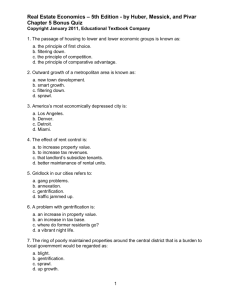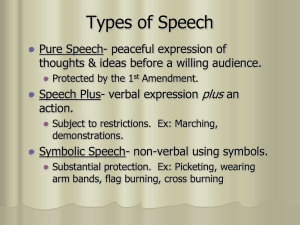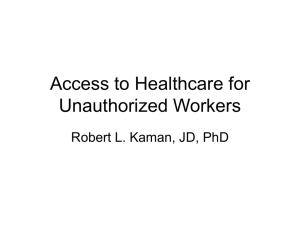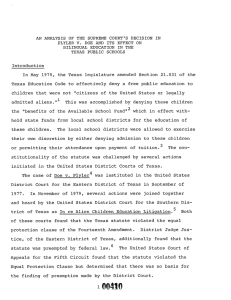Word Format - Penn Model Congress
advertisement
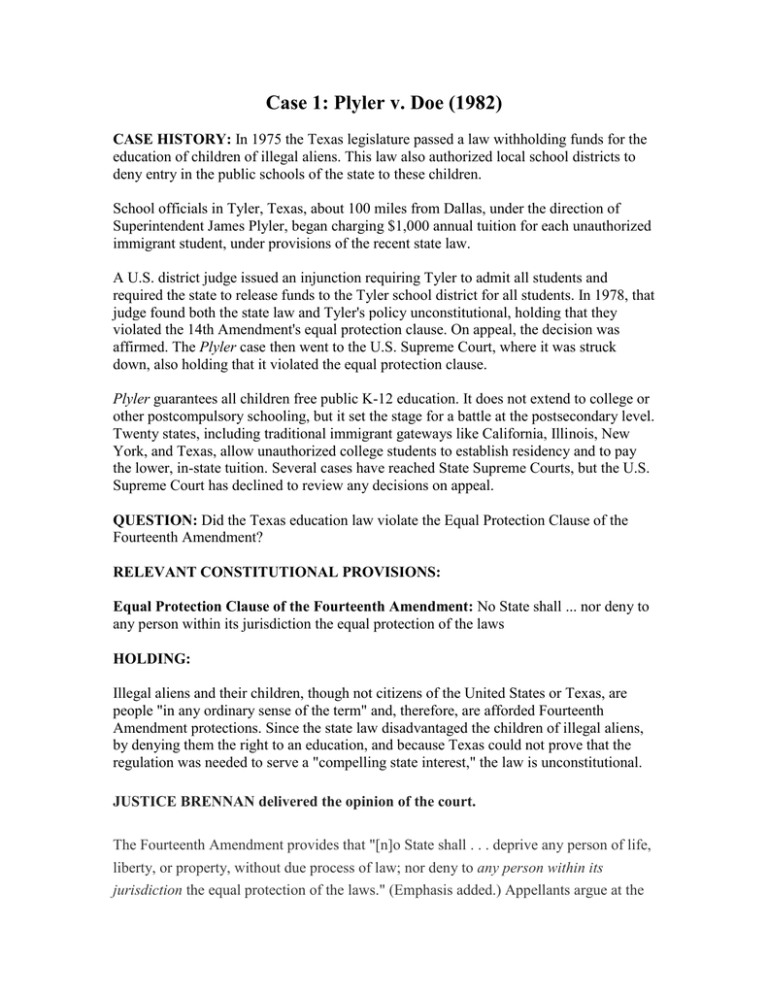
Case 1: Plyler v. Doe (1982) CASE HISTORY: In 1975 the Texas legislature passed a law withholding funds for the education of children of illegal aliens. This law also authorized local school districts to deny entry in the public schools of the state to these children. School officials in Tyler, Texas, about 100 miles from Dallas, under the direction of Superintendent James Plyler, began charging $1,000 annual tuition for each unauthorized immigrant student, under provisions of the recent state law. A U.S. district judge issued an injunction requiring Tyler to admit all students and required the state to release funds to the Tyler school district for all students. In 1978, that judge found both the state law and Tyler's policy unconstitutional, holding that they violated the 14th Amendment's equal protection clause. On appeal, the decision was affirmed. The Plyler case then went to the U.S. Supreme Court, where it was struck down, also holding that it violated the equal protection clause. Plyler guarantees all children free public K-12 education. It does not extend to college or other postcompulsory schooling, but it set the stage for a battle at the postsecondary level. Twenty states, including traditional immigrant gateways like California, Illinois, New York, and Texas, allow unauthorized college students to establish residency and to pay the lower, in-state tuition. Several cases have reached State Supreme Courts, but the U.S. Supreme Court has declined to review any decisions on appeal. QUESTION: Did the Texas education law violate the Equal Protection Clause of the Fourteenth Amendment? RELEVANT CONSTITUTIONAL PROVISIONS: Equal Protection Clause of the Fourteenth Amendment: No State shall ... nor deny to any person within its jurisdiction the equal protection of the laws HOLDING: Illegal aliens and their children, though not citizens of the United States or Texas, are people "in any ordinary sense of the term" and, therefore, are afforded Fourteenth Amendment protections. Since the state law disadvantaged the children of illegal aliens, by denying them the right to an education, and because Texas could not prove that the regulation was needed to serve a "compelling state interest," the law is unconstitutional. JUSTICE BRENNAN delivered the opinion of the court. The Fourteenth Amendment provides that "[n]o State shall . . . deprive any person of life, liberty, or property, without due process of law; nor deny to any person within its jurisdiction the equal protection of the laws." (Emphasis added.) Appellants argue at the outset that undocumented aliens, because of their immigration status, are not "persons within the jurisdiction" of the State of Texas, and that they therefore have no right to the equal protection of Texas law. We reject this argument. Whatever his status under the immigration laws, an alien is surely a "person" in any ordinary sense of that term. Aliens, even aliens whose presence in this country is unlawful, have long been recognized as "persons" guaranteed due process of law by the Fifth and Fourteenth Amendments. Shaughnessv v. Mezei; Wong Wing v. United States; Yick Wo v. Hopkins. Indeed, we have clearly held that the Fifth Amendment protects aliens whose presence in this country is unlawful from invidious discrimination by the Federal Government. Mathews v. Diaz. Our conclusion that the illegal aliens who are plaintiffs in these cases may claim the benefit of the Fourteenth Amendment's guarantee of equal protection only begins the inquiry. The more difficult question is whether the Equal Protection Clause has been violated by the refusal of the State of Texas to reimburse local school boards for the education of children who cannot demonstrate that their presence within the United States is lawful, or by the imposition by those school boards of the burden of tuition on those children. It is to this question that we now turn. The Equal Protection Clause was intended as a restriction on state legislative action inconsistent with elemental constitutional premises. We have recognized that certain forms of legislative classification, while not facially invidious, nonetheless give rise to recurring constitutional difficulties; in these limited circumstances, we have sought the assurance that the classification reflects a reasoned judgment consistent with the ideal of equal protection by inquiring whether it may fairly be viewed as furthering a substantial interest of the State. Sheer incapability or lax enforcement of the laws barring entry into this country, coupled with the failure to establish an effective bar to the employment of undocumented aliens, has resulted in the creation of a substantial "shadow population" of illegal migrants -numbering in the millions -- within our borders. This situation raises the specter of a permanent caste of undocumented resident aliens, encouraged by some to remain here as a source of cheap labor, but nevertheless denied the benefits that our society makes available to citizens and lawful residents. The existence of such an underclass presents most difficult problems for a Nation that prides itself on adherence to principles of equality under law. The children who are plaintiffs in these cases are special members of this underclass. Persuasive arguments support the view that a State may withhold its beneficence from those whose very presence within the United States is the product of their own unlawful conduct. These arguments do not apply with the same force to classifications imposing disabilities on the minor children of such illegal entrants. At the least, those who elect to enter our territory by stealth and in violation of our law should be prepared to bear the consequences, including, but not limited to, deportation. But the children of those illegal entrants are not comparably situated. The children who are plaintiffs in these cases "can affect neither their parents' conduct nor their own status." Trimble v. Gordon. Even if the State found it expedient to control the conduct of adults by acting against their children, legislation directing the onus of a parent's misconduct against his children does not comport with fundamental conceptions of justice. In addition to the pivotal role of education in sustaining our political and cultural heritage, denial of education to some isolated group of children poses an affront to one of the goals of the Equal Protection Clause: the abolition of governmental barriers presenting unreasonable obstacles to advancement on the basis of individual merit. Paradoxically, by depriving the children of any disfavored group of an education, we foreclose the means by which that group might raise the level of esteem in which it is held by the majority. But more directly, "education prepares individuals to be self-reliant and self-sufficient participants in society." Wisconsin v. Yoder. Illiteracy is an enduring disability. The inability to read and write will handicap the individual deprived of a basic education each and every day of his life. The inestimable toll of that deprivation on the social, economic, intellectual, and psychological wellbeing of the individual, and the obstacle it poses to individual achievement, make it most difficult to reconcile the cost or the principle of a status-based denial of basic education with the framework of equality embodied in the Equal Protection Clause. What we said 28 years ago in Brown v. Board of Education, still holds true: "Today, education is perhaps the most important function of state and local governments. Compulsory school attendance laws and the great expenditures for education both demonstrate our recognition of the importance of education to our democratic society. It is required in the performance of our most basic public responsibilities, even service in the armed forces. It is the very foundation of good citizenship. Today it is a principal instrument in awakening the child to cultural values, in preparing him for later professional training, and in helping him to adjust normally to his environment. In these days, it is doubtful that any child may reasonably be expected to succeed in life if he is denied the opportunity of an education. Such an opportunity, where the state has undertaken to provide it, is a right which must be made available to all on equal terms." Id. at 347 U. S. 493. In determining the rationality of § 21. 031, we may appropriately take into account its costs to the Nation and to the innocent children who are its victims. In light of these countervailing costs, the discrimination contained in § 21.031 can hardly be considered rational unless it furthers some substantial goal of the State. It is the State's principal argument, and apparently the view of the dissenting Justices, that the undocumented status of these children vel non establishes a sufficient rational basis for denying them benefits that a State might choose to afford other residents. In the State's view, Congress' apparent disapproval of the presence of these children within the United States, and the evasion of the federal regulatory program that is the mark of undocumented status, provides authority for its decision to impose upon them special disabilities. Faced with an equal protection challenge respecting the treatment of aliens, we agree that the courts must be attentive to congressional policy; the exercise of congressional power might well affect the State's prerogatives to afford differential treatment to a particular class of aliens. But we are unable to find in the congressional immigration scheme any statement of policy that might weigh significantly in arriving at an equal protection balance concerning the State's authority to deprive these children of an education. The States enjoy no power with respect to the classification of aliens. See Hines v. Davidowitz. This power is "committed to the political branches of the Federal Government." Mathews v. Diaz . Although it is "a routine and normally legitimate part" of the business of the Federal Government to classify on the basis of alien status, and to "take into account the character of the relationship between the alien and this country," only rarely are such matters relevant to legislation by a State. Nyquist v. Mauclet . As we recognized in De Canas v. Bica, the States do have some authority to act with respect to illegal aliens, at least where such action mirrors federal objectives and furthers a legitimate state goal. There is no indication that the disability imposed by § 21.031 corresponds to any identifiable congressional policy. The State does not claim that the conservation of state educational resources was ever a congressional concern in restricting immigration. More importantly, the classification reflected in § 21.031 does not operate harmoniously within the federal program. Appellants argue that the classification at issue furthers an interest in the "preservation of the state's limited resources for the education of its lawful residents." Brief for Appellants 26. The State must do more than justify its classification with a concise expression of an intention to discriminate. Apart from the asserted state prerogative to act against undocumented children solely on the basis of their undocumented status -- an asserted prerogative that carries only minimal force in the circumstances of these cases -- we discern three colorable state interests that might support § 21.031. First, appellants appear to suggest that the State may seek to protect itself from an influx of illegal immigrants. While a State might have an interest in mitigating the potentially harsh economic effects of sudden shifts in population, § 21.031 hardly offers an effective method of dealing with an urgent demographic or economic problem. There is no evidence in the record suggesting that illegal entrants impose any significant burden on the State's economy. To the contrary, the available evidence suggests that illegal aliens underutilize public services, while contributing their labor to the local economy and tax money to the state fisc. The dominant incentive for illegal entry into the State of Texas is the availability of employment; few if any illegal immigrants come to this country, or presumably to the State of Texas, in order to avail themselves of a free education. Thus, even making the doubtful assumption that the net impact of illegal aliens on the economy of the State is negative, we think it clear that "[c]harging tuition to undocumented children constitutes a ludicrously ineffectual attempt to stem the tide of illegal immigration," at least when compared with the alternative of prohibiting the employment of illegal aliens. Second, while it is apparent that a State may "not . . . reduce expenditures for education by barring [some arbitrarily chosen class of] children from its schools," Shapiro v. Thompson, appellants suggest that undocumented children are appropriately singled out for exclusion because of the special burdens they impose on the State's ability to provide high-quality public education. But the record in no way supports the claim that exclusion of undocumented children is likely to improve the overall quality of education in the State. As the District Court in No. 801934 noted, the State failed to offer any "credible supporting evidence that a proportionately small diminution of the funds spent on each child [which might result from devoting some state funds to the education of the excluded group] will have a grave impact on the quality of education." And, after reviewing the State's school financing mechanism, the District Court in No. 80-1538 concluded that barring undocumented children from local schools would not necessarily improve the quality of education provided in those schools. Of course, even if improvement in the quality of education were a likely result of barring some number of children from the schools of the State, the State must support its selection of this group as the appropriate target for exclusion. In terms of educational cost and need, however, undocumented children are "basically indistinguishable" from legally resident alien children. Id. at 589. Finally, appellants suggest that undocumented children are appropriately singled out because their unlawful presence within the United States renders them less likely than other children to remain within the boundaries of the State, and to put their education to productive social or political use within the State. Even assuming that such an interest is legitimate, it is an interest that is most difficult to quantify. The State has no assurance that any child, citizen or not, will employ the education provided by the State within the confines of the State's borders. In any event, the record is clear that many of the undocumented children disabled by this classification will remain in this country indefinitely, and that some will become lawful residents or citizens of the United States. It is difficult to understand precisely what the State hopes to achieve by promoting the creation and perpetuation of a subclass of illiterates within our boundaries, surely adding to the problems and costs of unemployment, welfare, and crime. It is thus clear that whatever savings might be achieved by denying these children an education, they are wholly insubstantial in light of the costs involved to these children, the State, and the Nation. If the State is to deny a discrete group of innocent children the free public education that it offers to other children residing within its borders, that denial must be justified by a showing that it furthers some substantial state interest. No such showing was made here. Accordingly, the judgment of the Court of Appeals in each of these cases is Affirmed.

